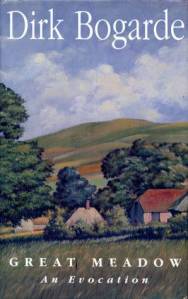 ‘An evocation’ says the cover, and evocation is exactly the right word. This is a childhood memoir, written from old age and it is quite lovely.
‘An evocation’ says the cover, and evocation is exactly the right word. This is a childhood memoir, written from old age and it is quite lovely.
Dirk Bogarde was undoubtedly blessed. His father was the art editor of the Sunday Times, his mother was a former actress, and the family was more than comfortably off. Their home was on the Sussex Downs,and the children seemed to live their lives out of doors, coming home only for practical necessities. That included meals and those were reported frequently, and always with loving detail.
“It was shepherd’s pie and runner beans for lunch, and Daddies sauce. Which was a particular treat because it was never allowed in the dining room when our parents were there, which seemed a pit because it had a quite interesting picture on it of a very happy father and mother and their children, and the father was smiling like anything and holding the bottle of sauce. That was why it was called Daddies, you see. But it was a very good sauce anyway, and it went down a treat, as Lally said, with a bit of shepherd’s pie. And then there was treacle tart for pudding, only because it was still summertime, and we’d had it hot the day before. We had it cold with clotted cream from the Court Dairy, and it was really pretty good, all sticky and crinkly.”
The voice and the words there, and throughout this memoir are those of a child. They are simple, precise and unsentimental, and they paint pictures beautifully. But they are filtered through an adult understanding. The boy didn’t understand the significance of the words ‘she might lose it’ when his mother fell on the stairs but the adult did, and so the boy reported that incident.
Those moments like that were the smallest of distractions; I was completely captivated by this evocation of an idyllic childhood. There was little incident – just an occasional visitor, an occasional trip – but young lives were lived.
Lally was indispensable. She had been nanny – she still was, even though her charges considered themselves far too grown up for these things – and she kept the household running smoothly. It is to her that this book is dedicated.
It is the story of a happy family, in a world that would soon be changed forever by World War II.
The highlight came at Christmas.
“The most beautiful tree you’ve ever seen. All gold and silver. Shining in the firelight. And we all cried out in surprise, and our father said the only thing was not to touch it really, because it was all made of holly branches and he’s had to paint all the leaves gold and silver by hand and it had taken him half the night. Our mother said that was his punishment for forgetting the tree in the first place, and Lally said it was a good thing she wasn’t about to do any washing because her clothes’ prop was now covered in holly and thick as a hedgehog with nails, and our father said that there was quite a gap in the fence down at the Daukeses’ cottage.”
And the lowest moments where when Lally fell ill. The terrible fear that she might die, that she might not be coming back. And the realisation that, loved though she was, she was not one of the family and came from a very different world.
Everything important in a young life is here, sights, sounds, incidents perfectly recalled more than fifty years after the fact.
The result is a lovely little book, with the power to pull you back to another time and place.
I did so enjoy reading this post. Thanks.
You are very welcome. It was lovely to be able to share such a lovely memoir.
I’ve heard that this is one of the best of the autobiographical volumes he wrote so will give it a try if I see it in the library.
I’ve not read any of the others, but I will be looking out for them. This one came from Cornwall Libraries’ reserve stock and hopefully Devon has a copy tucked away somewhere too.
I love the word “evocation”… that alone would draw me to the book. It sounds delightful!
Yes, it is a lovely word – and a lovely book.
Pingback: Sunday Caught My Interest | Reflections from the Hinterland
I love – and have on the shelf – all Dirk Bogarde’s autobiographical writings. They are excellent. Don’t like his fiction, though.